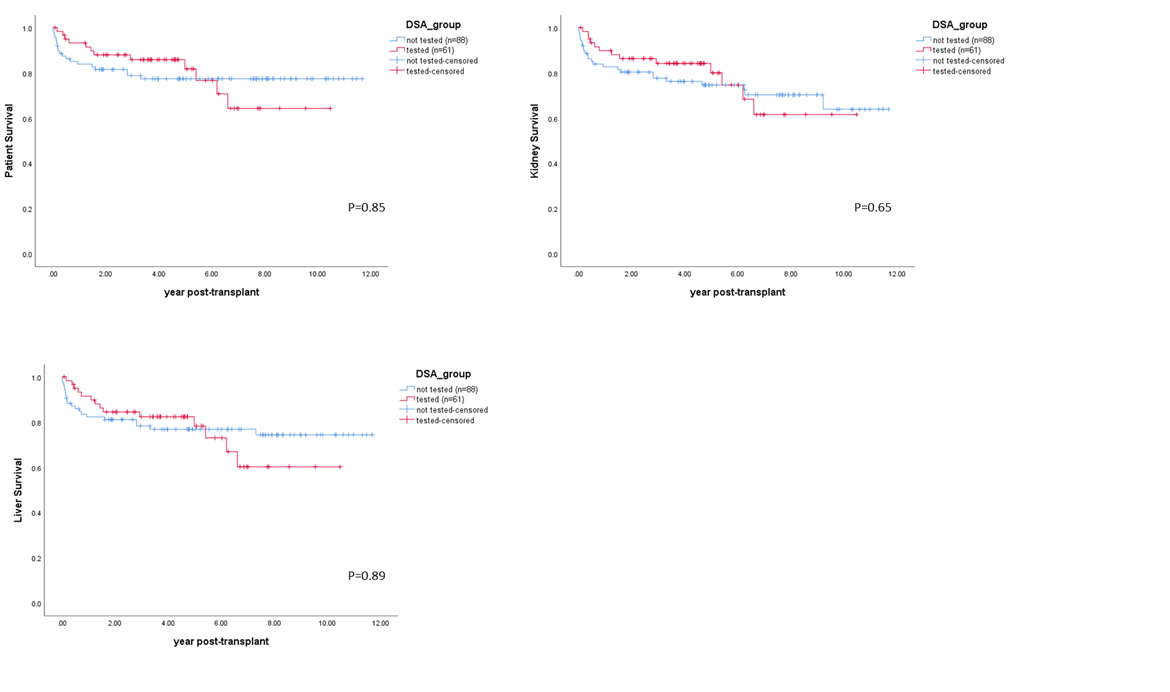Is There a Role for Donor-Specific Antibody Testing in Simultaneous Liver-Kidney Transplantation? A Single Center Analysis of Outcomes
University of Southern California, Los Angeles, CA
Meeting: 2021 American Transplant Congress
Abstract number: 339
Keywords: Graft survival, HLA antibodies, Kidney/liver transplantation, Rejection
Topic: Clinical Science » Liver » Liver: Immunosuppression and Rejection
Session Information
Session Name: Post Liver Transplant Management and Complications
Session Type: Rapid Fire Oral Abstract
Date: Tuesday, June 8, 2021
Session Time: 4:30pm-5:30pm
 Presentation Time: 4:55pm-5:00pm
Presentation Time: 4:55pm-5:00pm
Location: Virtual
*Purpose: Simultaneous liver-kidney transplantation (SLKT) has grown exponentially since its conception in the 1960’s. The role for donor specific antibody (DSA) testing in SLKT is unclear. The purpose of this single-center study was to assess the impact of DSA testing on outcomes including rate of rejection, graft survival, and patient survival following SLKT.
*Methods: Patients who underwent primary SLKT between 2008-2018 at our center were reviewed retrospectively. DSA testing has only recently been integrated into our protocol. Demographic and clinical characteristics were summarized using mean and standard deviation for continuous variables and counts with percentages for categorical variables. Patient and graft survival were calculated using the Kaplan-Meier method.
*Results: A total of 149 patients met inclusion criteria. The mean age at transplant was 55.4 ±10.4 years, 92 (61.7%) were males, and the majority were Hispanic (55.7%). The most common liver diagnosis leading to transplant was alcoholic liver disease (22.1%) followed by viral hepatitis (17.4%). 57 (38.3%) patients experienced at least one episode of acute liver rejection, mostly mild (44.6% RAI=3). However, only 16 patients had kidney rejection, with 3 having at least one episode of antibody mediated rejection. Overall, 61 patients were screened for DSA post-transplant, and 28 (45.9%) had at least one DSA detected. There were 11 patients with both liver and kidney rejection, of whom 6 were DSA positive. At the time of the last follow-up, 79.2% of patients were alive with a mean overall survival of 9.3 years (95% CI 8.5-10). Kidney and liver graft survival were 75.2% (mean overall graft survival 8.7 years, 95% CI 7.9-9.5) and 75.8% (mean overall graft survival 9 years, 95% CI 8.2-9.8) respectively. There was no difference in graft and patient survival when we stratified by either DSA test performed or DSA status (Fig 1).
*Conclusions: These data demonstrate that SLKT is associated with excellent long-term patient and allograft survival. Moreover, whether or not DSA was tested or detected, a low rate of kidney rejection was observed. In our experience, testing for DSA does not impact SLKT outcomes.
To cite this abstract in AMA style:
Das A, Barbetta A, Remulla D, Goldbeck C, Maw T, Kim J. Is There a Role for Donor-Specific Antibody Testing in Simultaneous Liver-Kidney Transplantation? A Single Center Analysis of Outcomes [abstract]. Am J Transplant. 2021; 21 (suppl 3). https://atcmeetingabstracts.com/abstract/is-there-a-role-for-donor-specific-antibody-testing-in-simultaneous-liver-kidney-transplantation-a-single-center-analysis-of-outcomes/. Accessed February 27, 2026.« Back to 2021 American Transplant Congress

